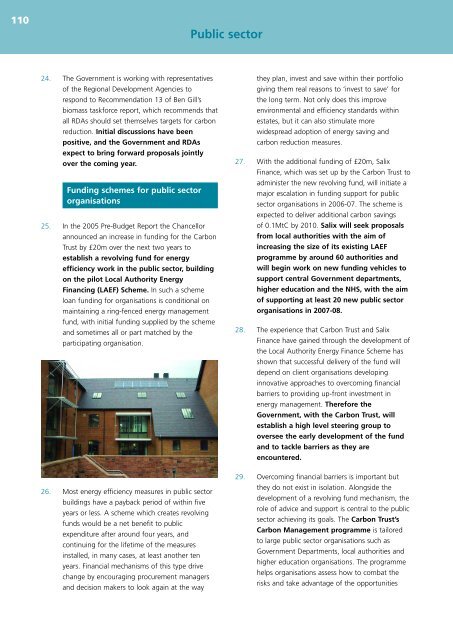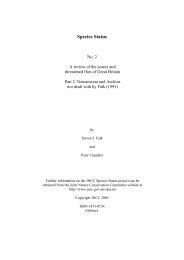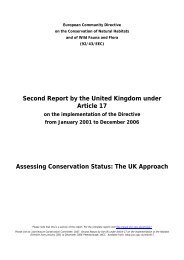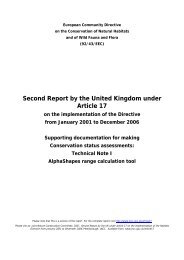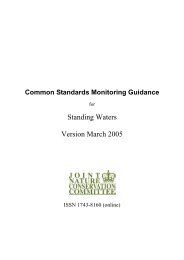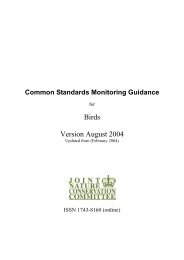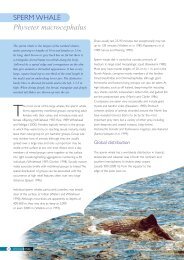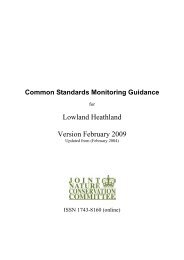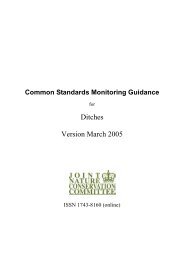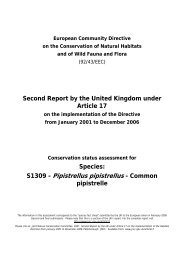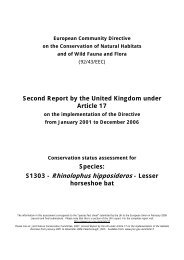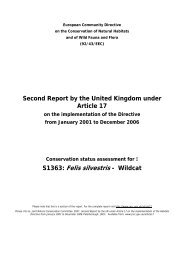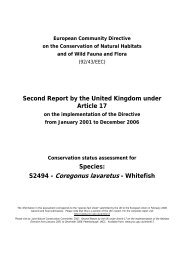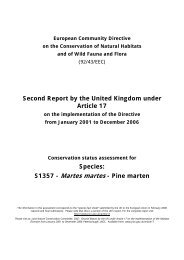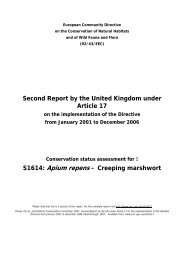UK Climate Change Programme 2006 - JNCC - Defra
UK Climate Change Programme 2006 - JNCC - Defra
UK Climate Change Programme 2006 - JNCC - Defra
You also want an ePaper? Increase the reach of your titles
YUMPU automatically turns print PDFs into web optimized ePapers that Google loves.
110<br />
Public sector<br />
24. The Government is working with representatives<br />
of the Regional Development Agencies to<br />
respond to Recommendation 13 of Ben Gill’s<br />
biomass taskforce report, which recommends that<br />
all RDAs should set themselves targets for carbon<br />
reduction. Initial discussions have been<br />
positive, and the Government and RDAs<br />
expect to bring forward proposals jointly<br />
over the coming year.<br />
Funding schemes for public sector<br />
organisations<br />
25. In the 2005 Pre-Budget Report the Chancellor<br />
announced an increase in funding for the Carbon<br />
Trust by £20m over the next two years to<br />
establish a revolving fund for energy<br />
efficiency work in the public sector, building<br />
on the pilot Local Authority Energy<br />
Financing (LAEF) Scheme. In such a scheme<br />
loan funding for organisations is conditional on<br />
maintaining a ring-fenced energy management<br />
fund, with initial funding supplied by the scheme<br />
and sometimes all or part matched by the<br />
participating organisation.<br />
they plan, invest and save within their portfolio<br />
giving them real reasons to ‘invest to save’ for<br />
the long term. Not only does this improve<br />
environmental and efficiency standards within<br />
estates, but it can also stimulate more<br />
widespread adoption of energy saving and<br />
carbon reduction measures.<br />
27. With the additional funding of £20m, Salix<br />
Finance, which was set up by the Carbon Trust to<br />
administer the new revolving fund, will initiate a<br />
major escalation in funding support for public<br />
sector organisations in <strong>2006</strong>-07. The scheme is<br />
expected to deliver additional carbon savings<br />
of 0.1MtC by 2010. Salix will seek proposals<br />
from local authorities with the aim of<br />
increasing the size of its existing LAEF<br />
programme by around 60 authorities and<br />
will begin work on new funding vehicles to<br />
support central Government departments,<br />
higher education and the NHS, with the aim<br />
of supporting at least 20 new public sector<br />
organisations in 2007-08.<br />
28. The experience that Carbon Trust and Salix<br />
Finance have gained through the development of<br />
the Local Authority Energy Finance Scheme has<br />
shown that successful delivery of the fund will<br />
depend on client organisations developing<br />
innovative approaches to overcoming financial<br />
barriers to providing up-front investment in<br />
energy management. Therefore the<br />
Government, with the Carbon Trust, will<br />
establish a high level steering group to<br />
oversee the early development of the fund<br />
and to tackle barriers as they are<br />
encountered.<br />
26. Most energy efficiency measures in public sector<br />
buildings have a payback period of within five<br />
years or less. A scheme which creates revolving<br />
funds would be a net benefit to public<br />
expenditure after around four years, and<br />
continuing for the lifetime of the measures<br />
installed, in many cases, at least another ten<br />
years. Financial mechanisms of this type drive<br />
change by encouraging procurement managers<br />
and decision makers to look again at the way<br />
29. Overcoming financial barriers is important but<br />
they do not exist in isolation. Alongside the<br />
development of a revolving fund mechanism, the<br />
role of advice and support is central to the public<br />
sector achieving its goals. The Carbon Trust’s<br />
Carbon Management programme is tailored<br />
to large public sector organisations such as<br />
Government Departments, local authorities and<br />
higher education organisations. The programme<br />
helps organisations assess how to combat the<br />
risks and take advantage of the opportunities


